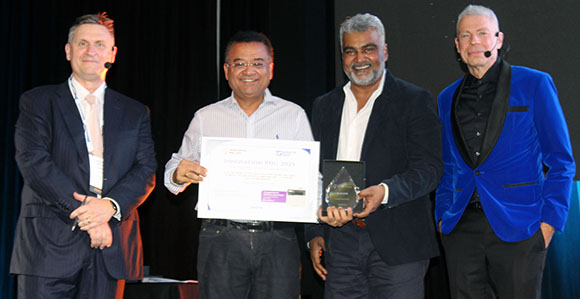Major Papua New Guinea superannuation fund Nasfund is pioneering the use of artificial intelligence (AI) with award-winning results. CEO Rajeev Sharma talks about the early wins from using the technology and why this is just the beginning for AI – for the fund and PNG businesses more generally.

Rajeev Sharma receives the 2025 Innovation PNG Award for Large Business for Nasfund’s AI project. From left: Business Advantage International’s Andrew Wilkins, Rajeev Sharma, award sponsor Navin Raju of Remington Group and chair of the awards judges, Mark Pesce. Credit: BAI/Godfreeman Kaptigau
Papua New Guinea’s largest private superannuation fund, Nasfund, took home one of the top honours at this year’s Innovation PNG Awards, winning the Award for Large Business for its use of artificial intelligence (AI) to streamline its accounts payable process.
The award recognises Nasfund’s successful implementation of DeepDelve Invoice AI, which is already delivering productivity gains of 40 per cent, freeing up an average of three hours per day for each accounts payable staff.
“It definitely has worked, and the [potential] use cases in AI are immense.”
Talking about the award, Nasfund CEO Rajeev Sharma said the firm deliberately chose to introduce AI in an area “which was not a huge problem, but where we could see that it would bring some improvement.”
He said the fund’s Accounts Payable process was identified as the right fit for AI because it previously required a lot of manual effort, which caused slow turnaround times and presented the risk of error, fraud and compliance issues.
Successful trial
In its trial phase, Nasfund tested how well the AI could extract data from supplier invoices, including computerised, EFTPOS, and handwritten formats. Invoices were deliberately physically crumpled to test the tool’s robustness.
The system then deployed a three-way matching technology, comparing purchase orders, supplier invoices and receipt notes to ensure data was consistent across all three.
If all the information matched, then “it would process the payment without any delay,” says Sharma.
But if there were any errors – for example, if the system detected a difference between the rates quoted in the purchase order and the supplier’s invoice – then the payment would go to internal auditors for manual processing.
By the end of the trial phase, Deep Delve was found to extract data with 97 per cent accuracy, “meaning we had more time to concentrate on what wasn’t working well,” Sharma noted.
“It [DeepDelve] makes things easier for us, and more transparent.”
Eyeing another leap
These initial improvements brought about by artificial intelligence are just the beginning for Nasfund, Sharma told the Innovation PNG Conference.
The next step, he revealed, will be the use of large language models to automate the entire payments process, resulting in a further 70 per cent reduction in invoice processing time, from 10 days to three days. Sharma expects to have this implemented in the second half of this year.
“AI-driven document processing will automate data extraction, validation and approval workflows. Smart anomaly detection will minimise errors, reducing the need for manual intervention,” Sharma explained.
“AI-powered invoice ingestion and three-way matching will reduce manual processing. Automated workflows will enable straight-through processing with minimal human oversight. This will result in a 78 per cent touchless invoice processing rate, instead of 30 per cent touchless processing, where most invoices are processed automatically, requiring little to no manual effort.”
Gamechanger for Nasfund
Concluding his speech, Sharma said AI would replace the old Software-as-a-Service model, saving firms such as Nasfund from having to make “huge investments” in technology.
“Now, if you are using AI, you will only pay as you go,” he said.
Calling the arrival of AI a “gamechanger,” he said Nasfund would look to implement it in other parts of its business.
“This is the start for us at Nasfund, because we just wanted to trial whether it works or doesn’t work,” he said.
“It definitely has worked, and the [potential] use cases in AI are immense.”
Nasfund had a strong financial year in 2024, delivering a 11.75% crediting rate to its 716,000 members, and building its asset base from K7.1 billion in 2023 to K8.1 billion.









Speak Your Mind